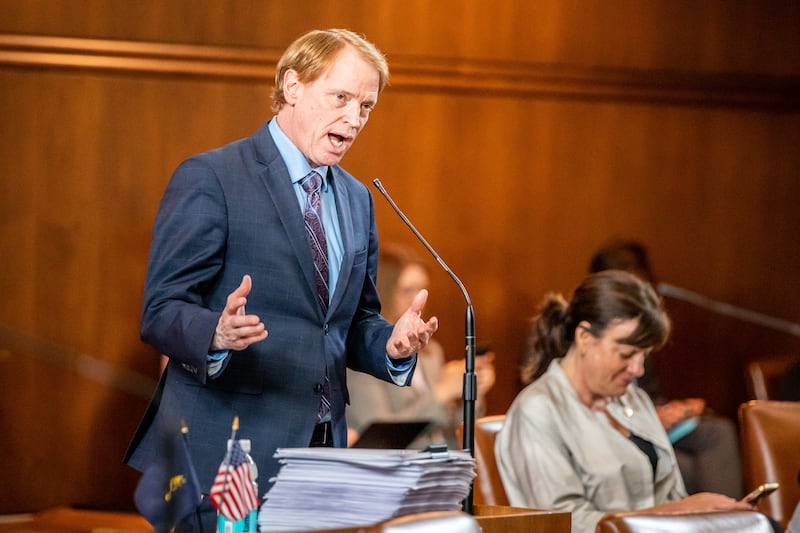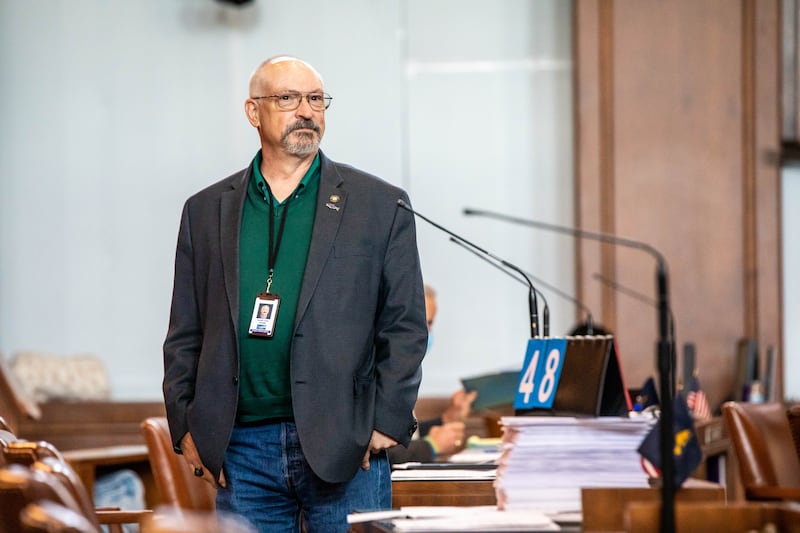As the final hours of Oregon’s 2023 legislative session careened to a conclusion, Bob Sallinger was driving a rental car in Rhode Island. His daughter pressed his cellphone to his ear so he could hear the audio from the Oregon Senate as it voted on Gov. Tina Kotek’s top remaining bill.
The votes trickled in slowly June 25. But the bill, which Kotek considered a key tool to increase housing supply, failed by a single vote.
“Wow, fuck yeah!” Sallinger, the conservation director for Willamette Riverkeeper, recalls exclaiming.
To Sallinger, the stakes could not have been higher. “This was the most significant assault on the land use planning system I’ve seen in 30 years,” he says. He and other environmentalists went to mattresses in the final week of session, imploring their supporters to pressure Democrats to vote no.
That set the stage for unlikely alliances: Kotek, who won election last year with record contributions from environmental groups, nonetheless teamed up with the Oregon Home Builders and Oregon Property Owners associations—and Senate Republicans, whose 43-day walkout had hamstrung the session. And ironically, the biggest loss in her governorship so far came at the hands of fellow Democrats.
Three days after the bill failed, Kotek still seemed stunned by her loss. “I thought I had a commitment to get the votes we needed,” she said last week. “I upheld my side of the bargain.”
Although Kotek and legislative Democrats passed much of their agenda this year, the failure of House Bill 3414 illustrates the learning curve facing her and Senate Democratic leaders, all new to their positions. It also shows the escalating conflict between the need to build more housing faster and Oregon’s land use planning system, now in its 50th year of sharply dividing city from farm and forest.
On a more encouraging note, it shows partisan adversaries can still work together despite the public rancor in Salem, even if they don’t succeed.
Senate Minority Leader Tim Knopp (R-Bend) earned infamy when he led his caucus on the longest walkout in Oregon history to block the passage of Democratic bills. But in the days before and after the June 25 vote, Knopp and Kotek communicated constantly about HB 3414—at least six calls by his count.
“She’s committed to passing the bill,” Knopp says. “And she hasn’t given up.”

In the final three days of the session, Kotek came to the Capitol to lobby lawmakers herself. As she knew from 15 years in the House, including nearly a decade as speaker, a personal touch can make a difference.
House Bill 3414 was part of Kotek’s effort to crank up housing production to 36,000 units a year—about twice the current rate. (Oregon is currently 140,000 housing units short of what the population requires—a key contributor to the unsheltered homelessness spiraling across the state.) Earlier in the session, the governor got lawmakers to allocate $200 million in emergency housing funding and multiples of that for bonds for affordable housing. But HB 3414 proved trickier.
Initially, the bill would have allowed developers to get fast-track approval of virtually any new housing project and created a housing production office to make sure homes got built.
After environmentalists gained protections for sensitive areas through amendments, they shifted from opposition to neutrality.
Then in mid-June, as part of the negotiations to get Republicans back to work, Kotek and legislative leaders agreed to make HB 3414 a priority.
When Republicans returned, a new amendment supported by Kotek offered a prize homebuilders and property rights advocates long sought: a one-time, fast-track expansion of urban growth boundaries around the state to add more developable land.
“We were on record repeatedly saying we need to address land supply,” says Dave Hunnicutt, a lawyer and lobbyist for the Property Owners Association who has worked on the issue for nearly 30 years. “For us, it’s not a policy issue, it’s a math problem.”
Kotek agreed: It wasn’t enough to slice through the permitting, zoning and other red tape. Lawmakers also needed to free up more land. (Environmentalists disagree: They say there is ample land for development; there’s just insufficient infrastructure to support it.)
That new amendment galvanized the Oregon Conservation Network, which includes 42 environmental groups, led by organizations such as the Oregon League of Conservation Voters and 1000 Friends of Oregon. The OCN labeled the bill a “major threat.” (The amendment also generated stiff opposition from cities in the metro area as it would wipe out a hard-fought standstill on the Stafford district, a part of Clackamas County highly desirable for development.)
On June 24, the bill passed the House. Then, on June 25, by law the last day of session, it came up for a vote at about 1:30 pm on the Senate floor.
Hunnicutt and Home Builders Association CEO Jodi Hack nervously watched the vote on closed-circuit television. “The pressure that I felt on this bill exceeds any of the others I’ve worked on before,” says Hunnicutt, who has lobbied for greater development since 1996. “We put in so much time and effort and energy.”
And this time, he and the homebuilders had an unusual ally: a Democratic governor. “To her credit, the governor knew that the private developers are going to have to build almost all the units to meet her ambitious plans,” Hunnicutt says. “The fact that we have a governor who cares about the issue and understands it is fantastic.”
Normally, a presiding officer—in this case, Senate President Rob Wagner (D-Lake Oswego)—brings a bill to the floor for a vote only if he knows lawmakers have the votes to pass it.
But as the clerk counted the votes June 25, it became clear something had gone awry. Five Republican senators skipped the vote. That left 25 members. The bill needed three-fifths plus one, or 16, to pass.
“Republicans were able to muster eight votes,” Kotek said later. “I thought we could get eight votes from the Senate Democratic caucus to pass the bill.”
But two of the Democrats Kotek counted on—Sens. Chris Gorsek (D-Troutdale) and Deb Patterson (D-Salem)—voted no after an onslaught of opposition to the amended bill.
“Gorsek and Patterson said they were going to vote for it,” Knopp says. “Kotek said Patterson would be her 16th vote.” (Gorsek and Patterson declined to comment.)

With the tally standing at 14-10, only one vote remained before the bill would be killed—Sen. Daniel Bonham (R-The Dalles). It would have been difficult to imagine a less likely ally for Kotek than Bonham, the fiery conservative from the Columbia Gorge who has personally clashed with the governor.
“Sen. Bonham, how do you vote?” Wagner called from the dais. Bonham conferred with Knopp. The problem: By voting yes, Bonham would be completing the count—one vote shy of passage.
“I went to Tim and said, ‘What do you want me to do?’” Bonham recalls. “If I vote, this thing is done.”
Nearly five minutes passed with excruciating slowness as Bonham circumnavigated the floor seeking a way to flip a “no” to a “yes.”
He consulted with Sen. Kayse Jama (D-Portland), chair of the Senate Committee on Housing and Development and a supporter of the bill; he conferred with Senate Majority Leader Kate Lieber (D-Portland). All the while, Wagner continued to call on Bonham to vote—half a dozen times in all.
Finally, Bonham approached Wagner, who placed the session into recess. Their brief conversation went nowhere.
“He was just in no mood,” Bonham says. “He said, ‘We just need you to vote.’”
Bonham voted yes but the bill failed 15-10. Up on the third floor of the Senate building, Hunnicutt slumped in dejection. “It was a gut punch,” he says.
Kotek didn’t accept the result.
She cajoled Gorsek to change his vote. Her legislative director, Bob Livingston, texted Knopp, urging him to keep his members close in the event of a revote.
“My job was to try to seek reconsideration,” Kotek says.
No dice. About an hour after HB 3414 failed—eight hours short of the deadline—Wagner gaveled the session closed. Sallinger and his allies had won.
Kotek says Sallinger’s victory will be short-lived. She hopes to find common ground—and an agreement for more ground—before next year’s session.
“The topic is not going away,” Kotek says. “Housing is a crisis.”

